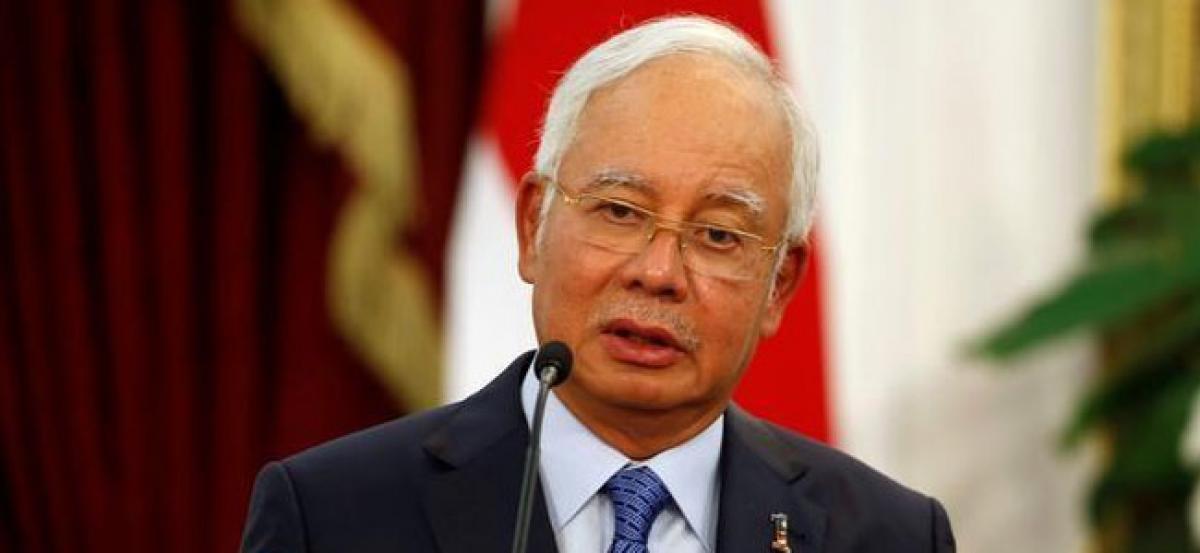Live
- GMR Airports Unveils AI-Powered Digital Twin Platform to Transform Airport Operations
- India poised to become leading maritime player: PM Modi
- Top Causes of Kidney Stones and How to Recognize Silent Symptoms
- India’s renewable energy capacity logs 14.2 pc growth at 213.7 GW
- Winter Session of Odisha Assembly adjourned sine die
- Biden calls Trump's tariff approach 'major mistake'
- After Drama Over Eknath Shinde’s Chief Minister Race, Maharashtra Cabinet Formation Faces New Tensions
- Egyptian FM, Blinken discuss recent developments in Syria
- Iran's supreme leader says Syria's developments result of US-Israeli 'plot'
- Elon Musk to Purchase $100 Million Luxury Mansion Next to Donald Trump's Mar-a-Lago, Report Reveals
Just In

Malaysian Prime Minister Najib Razak\'s stern rebuke to Myanmar for a military-led crackdown on Muslim Rohingyas was a rarity among Southeast Asian nations, who adhere to a policy of non-interference in each other\'s domestic affairs.
KUALA LUMPUR: Malaysian Prime Minister Najib Razak's stern rebuke to Myanmar for a military-led crackdown on Muslim Rohingyas was a rarity among Southeast Asian nations, who adhere to a policy of non-interference in each other's domestic affairs.
Critics saw the beleaguered Najib reaching for the moral high ground with his criticism over the weekend of Myanmar in order to pander to Malay Muslim voters after a series of protests calling for him to resign over a corruption scandal.
Najib is eyeing elections in the second half of 2017, nearly a year ahead of the 2018 deadline, a government source told Reuters.
At a rally on Sunday, Najib called for foreign intervention to stop the “genocide” of Rohingya Muslims and lashed out at Nobel laureate Aung San Suu Kyi for her inaction.
The persecution of the Rohingyas in Rakhine state, however, has been going on for years. It has forced hundreds of thousands to board flimsy boats and flee to neighbouring countries including Malaysia, Thailand and Indonesia - which along with Myanmar are all members of the Association of Southeast Asian Nations (ASEAN).
More than 100,000 Rohingya live in poverty and face harassment as illegal migrants in Malaysia. Many others fell into the hands of human traffickers on their perilous journeys from Myanmar.
MYANMAR INCENSED
The Myanmar government was incensed by Najib's criticism.
Presidential spokesman Zaw Htay said Myanmar was considering lodging an official complaint with ASEAN, the bloc of 10 Southeast Asian nations that agree on economic cooperation but pledge non-interference in each other's domestic issues.
"He (Najib) could have tried to handle this issue diplomatically through the ambassadors,” Zaw Htay was quoted telling the local media in Myanmar. He accused Najib of looking to win popular support among his Muslim voters.
Myanmar said this week it was halting workers going to Malaysia in response to the comments.
But Najib in his rally speech suggested that ASEAN must set aside its principle of non-interference to tackle regional issues like the Rohingya repressions and migrations, especially when they pose questions about universal values.
"We want to remind Myanmar’s government that the ASEAN charter also upholds basic human rights," the premier said in his speech.
INVISIBLE MIGRANTS
Rohingyas in Malaysia applauded Najib's intervention.
"Rohingya people are hoping something may change in Myanmar - and also in Malaysia where many of us live," said Faisal Islam Muhammad Kassim of the Rohingya Society in Malaysia.
Many of them live in squalor in Kuala Lumpur's suburbs, working illegally in restaurants and construction sites, where they are routinely underpaid. Families and single men live in matchbox apartments with over half a dozen cramped into one room.
"We are harassed everyday ... by the cops and by everyone," said a Rohingya migrant living illegally, who did not want to be identified. "We have no dignity here."
Malaysia is not a signatory to the 1951 UN Convention on the status of refugees, which means all refugees, including Rohingya, are viewed as illegal migrants awaiting resettlement in a third country.
The United Nations High Commissioner for Refugees (UNHCR) representative in Malaysia, Richard Towle, said Rohingyas in Malaysia are in the "invisible bottom 30 percent of society, and very much at risk of exploitation and abuse".
"Although it's proper to highlight the situation in Myanmar itself, it's also very important to look at the situation of the Rohingya in Bangladesh and here in Malaysia, where there is a lot we can still do to make their lives more secure and safer," Towle said.
PRESSURE OF SCANDAL
Najib's popularity dropped after he was linked to a multi-billion dollar graft scandal at state fund 1Malaysia Development Berhad (1MDB). Tens of thousands marched on the streets in capital Kuala Lumpur last month, demanding he step down and face corruption charges.
Najib has denied wrongdoing and has used powerful security laws to block dissenters and his opponents.
Najib needs the support of the powerful Islamist party PAS, to secure a convincing win in the next elections. The premier has put his weight behind an Islamic law, hudud, that sets out punishments such as amputation and stoning.
The law may be tabled in parliament next year.
"Quite clearly, there is a major domestic political dimension to this, as Najib positions himself as the champion of downtrodden Muslims in the region, which he and UMNO obviously believe will be popular in the Malay Muslim heartland," said Phil Robertson, deputy director for the Asia Division of Human Rights Watch.
"And of course, talking about the Rohingya is a good way to change the subject from the 1MDB scandal," he added.
Najib's office did not respond to requests for comment.

© 2024 Hyderabad Media House Limited/The Hans India. All rights reserved. Powered by hocalwire.com







